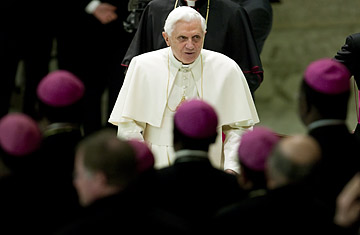
Pope Benedict XVI arrives for the weekly general audience in the Pope Paul VI hall at the Vatican.
John Paul II redefined papal travel by trekking to the most far-flung corners of the planet. In contrast, Benedict XVI, who was 20 years older than John Paul was at his papal election, sticks closer to home. Eight of his 14 foreign trips thus far have been in Europe, as are his next two: Portugal in May and Britain in September. But his focus on Europe is not principally a health decision for the 82-year-old Benedict, who has seemed energized by his few jaunts to South America, Australia and Africa. Instead, the Pope sees his European forays as journeys to hostile territory where he must try to counter the prevailing forces of secularism sweeping the continent.
As if on cue, Benedict's announcement in a meeting with British bishops Monday that he would make his first papal trip to Britain this fall was immediately followed by criticism of an equal rights bill making its way through Parliament that could effectively force Catholic organizations out of the adoption business because they won't serve gay couples. The church has also complained about the law's requirement that religious organizations strictly abide by non-discrimination clauses in the staff they hire. Benedict urged the Catholic leaders to oppose with "missionary zeal" the legislation that he says actually would "impose unjust limitations on the freedom of religious communities to act in accordance with their beliefs. In some respects it actually violates the natural law upon which the equality of all human beings is grounded and by which it is guaranteed."
Reaction was swift. British newspapers featured the story prominently, calling the comments an attack on equality rights. "Some might like to see him cold-shouldered by the Queen and the government because of his outspoken statements," the Guardian said in an editorial, referring to Benedict's upcoming trip. "This won't happen. By then, after all, the pope is likely to be protected from such religious discrimination by the very equalities legislation he now sees as a threat to justice and the natural order of things." Meanwhile, the London-based National Secular Society said it would stage protests during the Pope's time in Britain. The organization also launched a "Make the Pope Pay" petition to deny public funding for the state visit, which the group estimates could cost upwards of $30 million.
Of course, the Pope might expect this kind of treatment in Britain. There has been a strain of anti-papal sentiment in England dating back to King Henry VIII's break with the Catholic Church in the 16th century. And when the famously conservative Cardinal Joseph Ratzinger was elected Pope in 2005, the British press let loose a barrage of criticism and sometimes tasteless jokes about him. But the clash between Britain and the Vatican is now shaping up more than ever as a battle of ideas. The U.K. is home to a burgeoning atheist movement — led by the likes of Richard Dawkins, author of the best-selling book The God Delusion — which sees the Pope as a symbol of antiquated doctrine and organized religion's intrusion into public discourse. And Benedict will likely use the trip to shine a light on what he believes is a spreading prejudice in Europe against the devout and public pronouncements of faith.
Austen Ivereigh, a well-known London-based Catholic commentator, who has just launched a committee to help promote the Pope's U.K. visit, says the trip is a chance for Benedict to flex his intellectual muscle. "The Pope's mission when he comes to Britain will be to confront the rise of aggressive secularism and atheism on its own turf. And that turf is reason," says Ivereigh. "The Pope will challenge secularism by appealing to an English tradition of pluralism which he sees as being eclipsed by these laws." Although details of the itinerary won't be known for months, there has been talk of a possible papal lecture at Oxford University.
Before his English autumn trip, however, Benedict will have some lecturing to do this spring in Portugal. This traditionally observant Catholic nation has rapidly moved to the forefront of progressive social causes with the initial approval by its Parliament last month of a bill legalizing gay marriage. Final approval could coincide with the May arrival of Benedict, who has already referred to the bill as an "attack" on creation, which "strikes at the biological basis of the difference between the sexes."
After last month's vote, Prime Minister José Sócrates declared that his generation was guilty of having mistreated gays, and can now help rectify that by joining a growing list of European countries where gays can legally marry, including Belgium, Sweden, Spain, the Netherlands and Norway. He declared: "This is a step that will seem completely natural in the near future, in the same way that gender equality, abortion rights and unmarried couples living together are normal now." That is just what Benedict fears.
